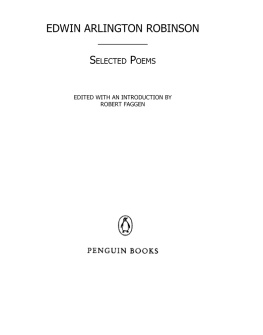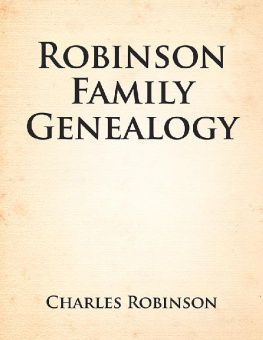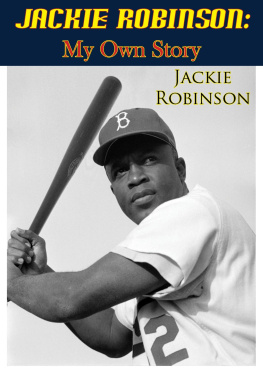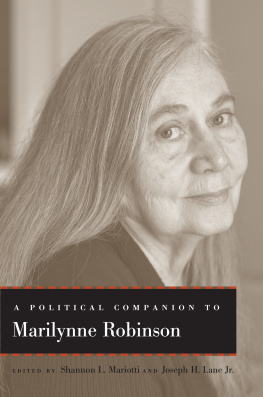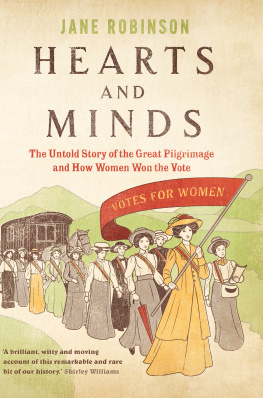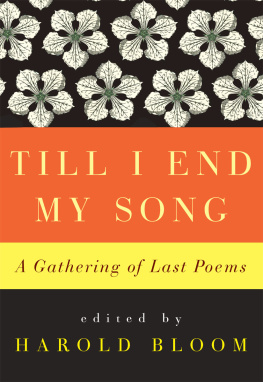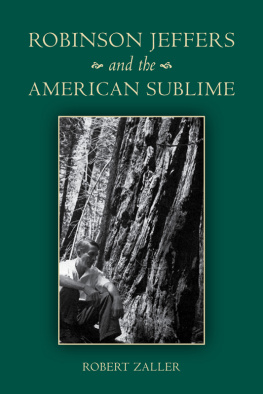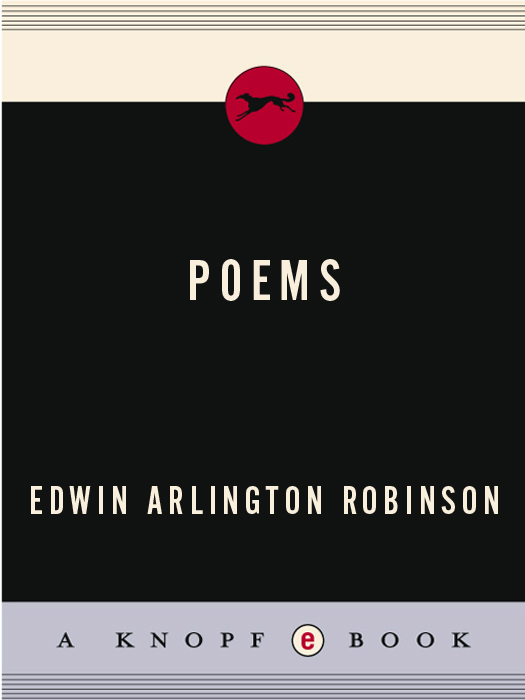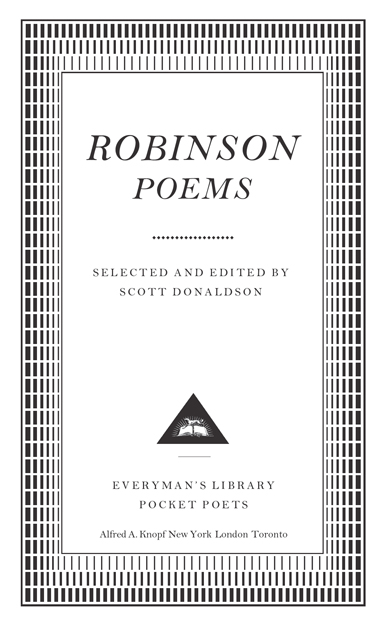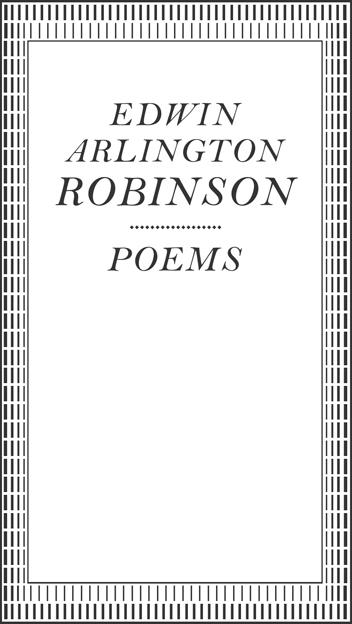THIS IS A BORZOI BOOK PUBLISHED BY ALFRED A. KNOPF This selection by Scott Donaldson first published in Everymans Library, 2007 Copyright 2007 by Everymans Library All rights reserved. Published in the United States by Alfred A. Knopf, a division of Random House, Inc., New York, and in Canada by Random House of Canada Limited, Toronto. Distributed by Random House, Inc., New York. Published in the United Kingdom by Everymans Library, Northburgh House, 10 Northburgh Street, London EC1V 0AT.
Distributed by Random House (UK) Ltd.
US website: www.randomhouse.com/everymans ISBN: 978-0-307-26576-0 & 0-307-26576-5 (US)
1-84159-775-9 (UK) A CIP catalogue record for this book is available from the British Library Library of Congress Cataloging-in-Publication Data
Robinson, Edwin Arlington, 18691935 [Poems. Selections]
Edwin Arlington Robinson: poems / selected and edited by
Scott Donaldson.
p. cm.(Everymans Library pocket poets)
ISBN 13: 978-0-307-26576-0 (alk. paper)
eBook ISBN: 978-0-8041-5294-5
I. Title. Series. Series.
PS3535.O25A6 2007
811.52dc22 2006048269 v3.1
CONTENTS
FOREWORD
Edwin Arlington Robinson was the first of the great American modernist poets, a fact too little recognized. He crafted his poems within the boundaries of meter and (usually) rhyme, and eschewed free verse, believing as he put it with characteristic wit that I write badly enough as it is. As a result, his work looks conventional, almost Victorian, on the page. Closer examination reveals just how revolutionary Robinson was: in diction, in subject matter, and in attitude. He wrote almost all of his best poetry during the quarter century following publication of his first book in 1896. From the beginning, he cast aside all the archaism and prettiness that afflicted
fin de sicle writing.
Robinson understood the power of everyday language. Scanning through the index of first lines at the end of this volume, one hears a conversational voice, about to tell a story. I did not think that I should find them there When I came back again We go no more to Calverlys You are a friend then, as I make it out, Of our man Shakespeare Sometimes, as in the last example, Robinson let his characters speak in dramatic monologue or dialogue. The wonder is that he managed to make the talk both metrical and to the life. Unlike most lyric poets, E.A. (as he liked to be called) rarely focused his gaze on himself.
Quiet and withdrawn from boyhood on, he looked around him at the fascinating world of other people, and listened, and set down what he saw and heard. Many of these people seemed unlikely subjects, but Robinson found poetry even in the most ordinary souls especially the downtrodden, the bereft, the misunderstood. In the process he created the gallery of character portraits for which he is most remembered, among them Eben Flood, Aunt Imogen, Isaac and Archibald, Miniver Cheevy, and the ubiquitous Richard Cory. Robinson did not marry he was in love with his older brothers wife yet in his many poems about husbands and wives he exhibited an extraordinary sensitivity to the complications of love and marriage. In these he emphasized how little we know about each other, and the damage done by those who pretend to such knowledge. We tell you, tapping on our brows,
The story as it should be Armed with this epistemological uncertainty, Robinson granted his characters the interest, compassion, and understanding they deserved, without passing judgment upon them.
In these several ways, Robinson created poems for us to go back to, as he helped prepare the way for the future. Scott Donaldson
Note: The poems are presented as in Robinsons Collected Poems (1921), with a few exceptions. Romance is taken from The Children of the Night (1897). Silver Street, New England, Karma, and The Sheaves are printed as in the periodicals where they were first published.
Oh for a poet for a beacon brightTo rift this changeless glimmer of dead gray;To spirit back the Muses, long astray, And flush Parnassus with a newer light;To put these little sonnet-men to flightWho fashion, in a shrewd mechanic way, Songs without souls, that flicker for a day, To vanish in irrevocable night. What does it mean? Shall there not one ariseTo wrench one banner from the western skies, And mark it with his name forevermore? Edwin Arlington Robinson, 1894
From THE CHILDREN OF THE NIGHT (1897)
DEAR FRIENDS
Dear friends, reproach me not for what I do, Nor counsel me, nor pity me; nor say That I am wearing half my life away For bubble-work that only fools pursue.
What does it mean? Shall there not one ariseTo wrench one banner from the western skies,
And mark it with his name forevermore? Edwin Arlington Robinson, 1894
From THE CHILDREN OF THE NIGHT (1897)
DEAR FRIENDS
Dear friends, reproach me not for what I do, Nor counsel me, nor pity me; nor say That I am wearing half my life away For bubble-work that only fools pursue.
And if my bubbles be too small for you, Blow bigger then your own: the games we play To fill the frittered minutes of a day, Good glasses are to read the spirit through. And whoso reads may get him some shrewd skill; And some unprofitable scorn resign, To praise the very thing that he deplores; So, friends (dear friends), remember, if you will, The shame I win for singing is all mine, The gold I miss for dreaming is all yours.
AARON STARK
Withal a meagre man was Aaron Stark, Cursed and unkempt, shrewd, shrivelled, and morose. A miser was he, with a misers nose, And eyes like little dollars in the dark. His thin, pinched mouth was nothing but a mark; And when he spoke there came like sullen blows Through scattered fangs a few snarled words and close, As if a cur were chary of its bark.
THE HOUSE ON THE HILL
They are all gone away, The House is shut and still, There is nothing more to say.
THE HOUSE ON THE HILL
They are all gone away, The House is shut and still, There is nothing more to say.
Through broken walls and gray The winds blow bleak and shrill: They are all gone away. Nor is there one today To speak them good or ill: There is nothing more to say. Why is it then we stray Around the sunken sill? They are all gone away, And our poor fancy-play For them is wasted skill: There is nothing more to say. There is ruin and decay In the House on the Hill: They are all gone away, There is nothing more to say.
JOHN EVERELDOWN
Where are you going tonight, tonight, Where are you going, John Evereldown? Theres never the sign of a star in sight, Nor a lamp thats nearer than Tilbury Town. Why do you stare as a dead man might? Where are you pointing away from the light? And where are you going tonight, tonight, Where are you going, John Evereldown? Right through the forest, where none can see, Theres where Im going, to Tilbury Town.
The men are asleep, or awake, may be, But the women are calling John Evereldown. Ever and ever they call for me, And while they call can a man be free? So right through the forest, where none can see, Theres where Im going, to Tilbury Town. But why are you going so late, so late, Why are you going, John Evereldown? Though the road be smooth and the way be straight, There are two long leagues to Tilbury Town. Come in by the fire, old man, and wait! Why do you chatter out there by the gate? And why are you going so late, so late, Why are you going, John Evereldown? I follow the women wherever they call, Thats why Im going to Tilbury Town. God knows if I pray to be done with it all, But God is no friend to John Evereldown.


